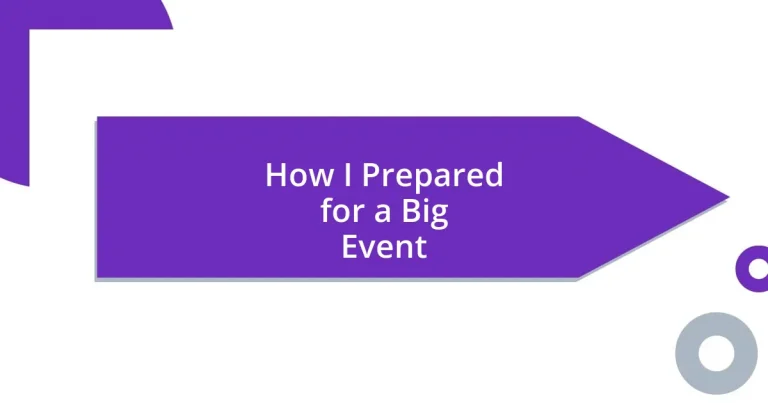Key takeaways:
- Understanding event requirements involves emotional connection and attention to detail, ensuring the event reflects the host’s vision.
- Setting clear goals and objectives creates a roadmap, guiding decisions and improving focus on tasks for a meaningful event.
- Assembling a reliable team based on trust and complementary skills enhances collaboration and effectiveness in executing event plans.
- Post-event reflection and feedback are crucial for personal growth and improving future events, transforming experiences into learning opportunities.
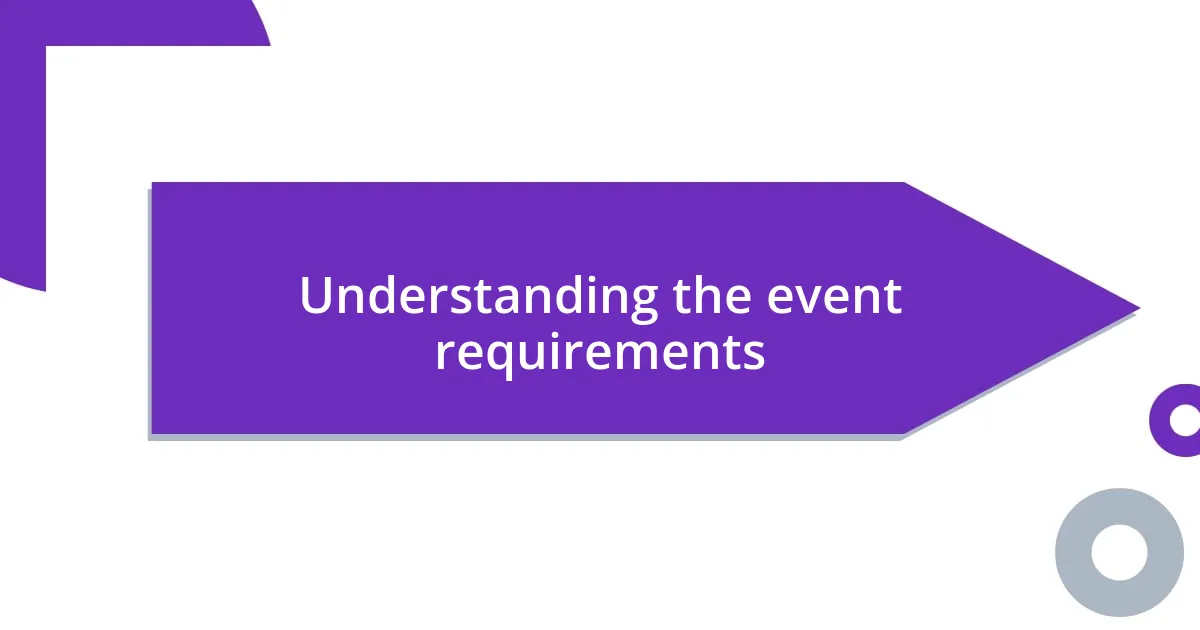
Understanding the event requirements
Understanding the requirements of an event can feel like deciphering a treasure map. I vividly remember preparing for my cousin’s wedding; the checklist seemed endless! I learned that carefully noting every detail—from the venue specifications to the type of audience—was crucial for planning a successful occasion.
I often ask myself, “What truly makes this event special?” For my sister’s milestone birthday, I took the time to connect with her vision, understanding her preferences, and that made all the difference. This emotional investment not only sparked my creativity but also ensured the event reflected her personality perfectly.
With my experience, I’ve realized that event requirements often extend beyond logistics. It’s about understanding the emotions tied to the gathering, whether it’s celebrating love, honoring a life, or fostering connections. This insight helped me tailor every aspect, ensuring guests felt the intended atmosphere, not just attended another event.
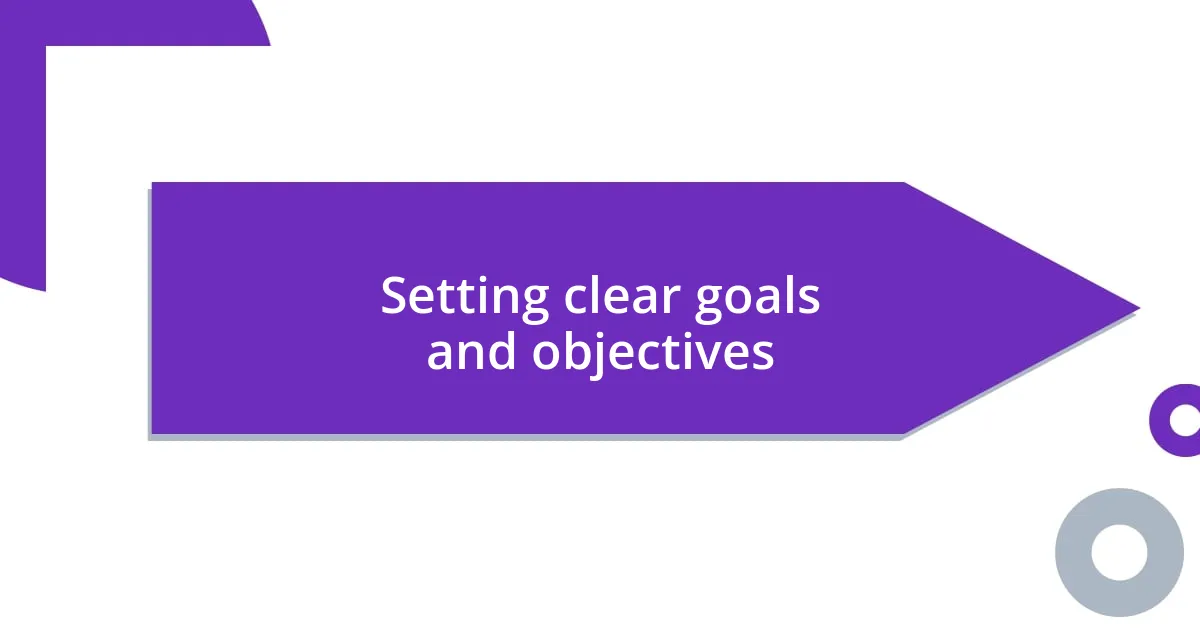
Setting clear goals and objectives
Setting clear goals and objectives is a foundational step that can make or break your event planning experience. I still recall when I was coordinating my best friend’s graduation party. I started by identifying the key goals—celebrating her achievement, creating lasting memories, and ensuring everyone had a good time. Breaking these down really helped me focus on the specific tasks needed to bring the vision to life.
When thinking about objectives, I often remind myself to prioritize what truly matters. For instance, during my niece’s first birthday, we aimed to foster joy and laughter among family and friends. Setting that as our main objective led us to choose fun games and a whimsical cake design. I’ve found that when goals are clearly defined, it becomes easier to check off tasks and stay on track, making the process smoother and more enjoyable.
Ultimately, the act of setting goals creates a roadmap for your event, guiding your decisions and helping you remain aligned with your vision. I’ve also noticed that revisiting these goals as the event date approaches allows me to adapt and refine my plans. Each time, I learn that the clearer my objectives are, the more focused and meaningful the event becomes for everyone involved.
| Goal | Objective |
|---|---|
| Celebrate an achievement | Create a memorable atmosphere |
| Foster connections | Encourage interaction among guests |
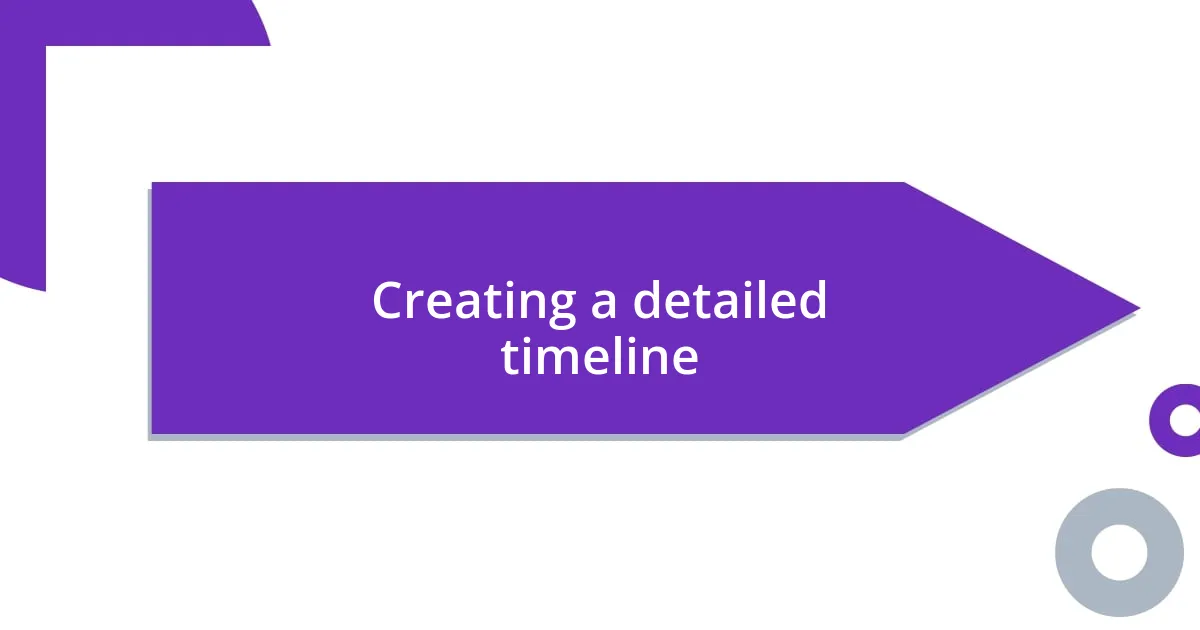
Creating a detailed timeline
Creating a detailed timeline is something I’ve found incredibly helpful in organizing events. For my cousin’s wedding, I mapped out every milestone, starting from the booking of the venue all the way to the tearful farewells at the end of the night. This visual guide allowed me to allocate specific timeframes to each task, ensuring I wouldn’t be left scrambling at the last minute. In moments of chaos, having that timeline kept me grounded and focused.
Here’s a glimpse of turning those abstract plans into a concrete timeline:
- Book the venue – 6 months prior
- Send save-the-dates – 5 months prior
- Finalize the guest list – 4 months prior
- Choose vendors (caterer, florist, etc.) – 3 months prior
- Confirm rentals and decor – 2 months prior
- Create a day-of schedule – 1 week prior
- Conduct a final walk-through at the venue – 2 days prior
Writing things down like this not only helps me track what’s done but also gives me a chance to savor the anticipation of each upcoming task. It’s that balance of organization and excitement that truly makes preparing for an event a memorable experience.
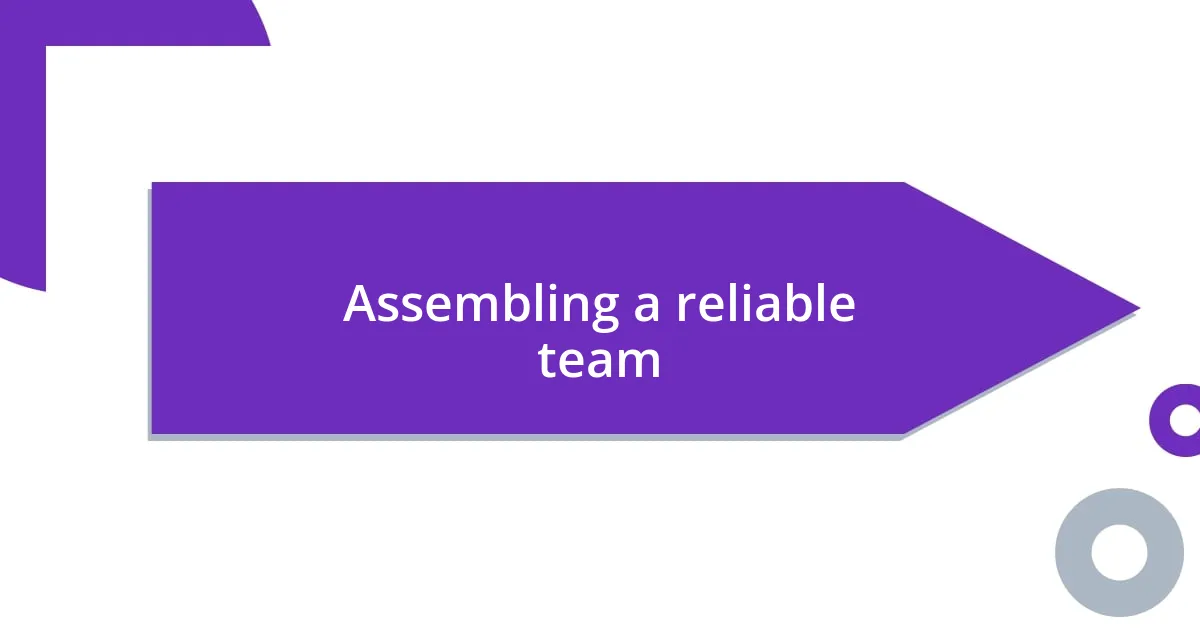
Assembling a reliable team
As I embarked on my journey to assemble a reliable team, I couldn’t help but think back to the time I organized a charity event. I knew I needed people who not only possessed the right skills but also shared a passion for the cause. After all, what good is a team if they aren’t invested in the mission? I reached out to friends and colleagues who had previously demonstrated dedication and creativity. It was a relief to see how quickly they rallied together when I shared my vision.
Selecting the right team members often means finding those who complement your strengths. I experienced this firsthand during my sister’s baby shower. I recruited a friend with a knack for design to create beautiful invitations, while another friend with strong organizational skills managed logistics. Witnessing how each member contributed their unique talents was not just effective; it was inspiring. I learned that collaboration is key, and sometimes, the best teams are formed by a blend of skills and personalities.
Trust is another cornerstone in building a dependable team. I find that open communication fosters this trust immensely. During a recent community festival, we held brainstorming sessions where everyone could voice their ideas and concerns. This level of transparency made each person feel valued, creating a supportive environment. Are we all on the same page? This question became our mantra, ensuring that when the event day arrived, we were synchronized and ready to tackle any challenges.
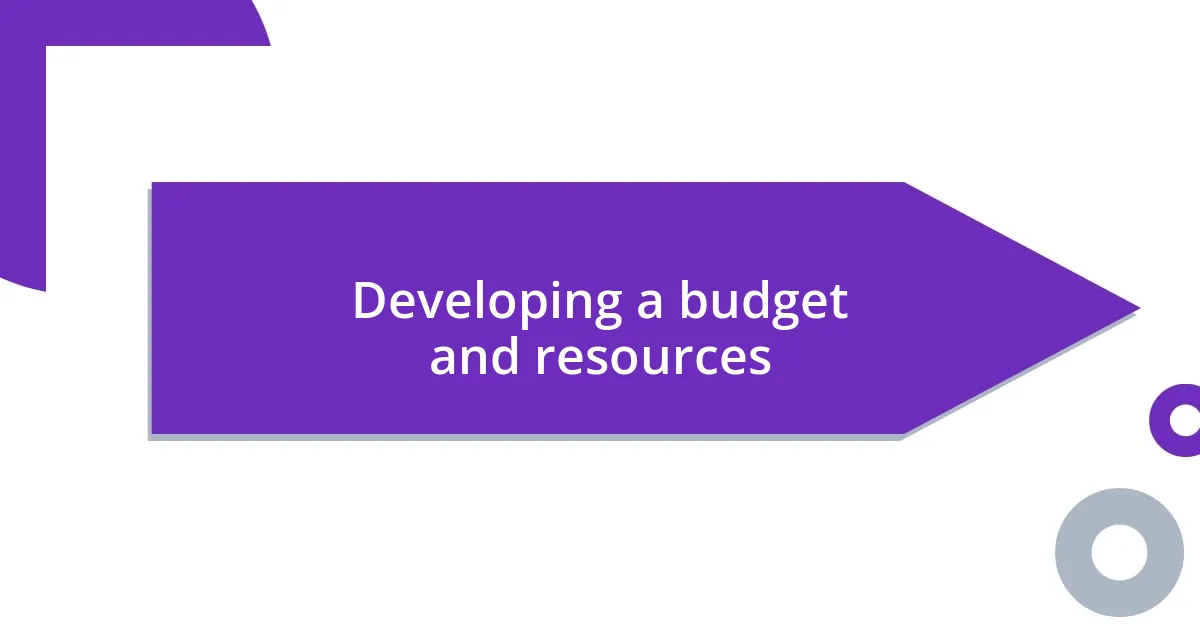
Developing a budget and resources
When I first set out to prepare for a big event, developing a budget was always my starting point. For my friend’s milestone birthday party, I created a simple spreadsheet to track expected expenses, which included venue rental, catering, and decorations. I still remember how calming it was to see everything laid out visually; it took away the anxiety that can creep in when you’re juggling multiple costs and made the planning process feel organized.
As I mapped out the resources needed, I also considered what I could borrow or rent instead of buying new items. That reminded me of the time I threw together a surprise engagement party. By reaching out to friends who had decorative items stashed away, I not only saved money but also felt a sense of community. Isn’t it amazing how sharing resources can strengthen connections? It really reinforced the idea that we can create beautiful events not just through our own efforts, but through collaboration and trust.
Ultimately, I discovered that adjusting my budget was an ongoing process. There were moments, like when I unexpectedly had to revise the headcount due to last-minute RSVPs, that required flexibility. I often learned to prioritize based on what truly mattered for the event and where I could cut costs without sacrificing the experience. This trial-and-error approach has shown me the importance of staying open-minded and adaptable throughout the planning journey.
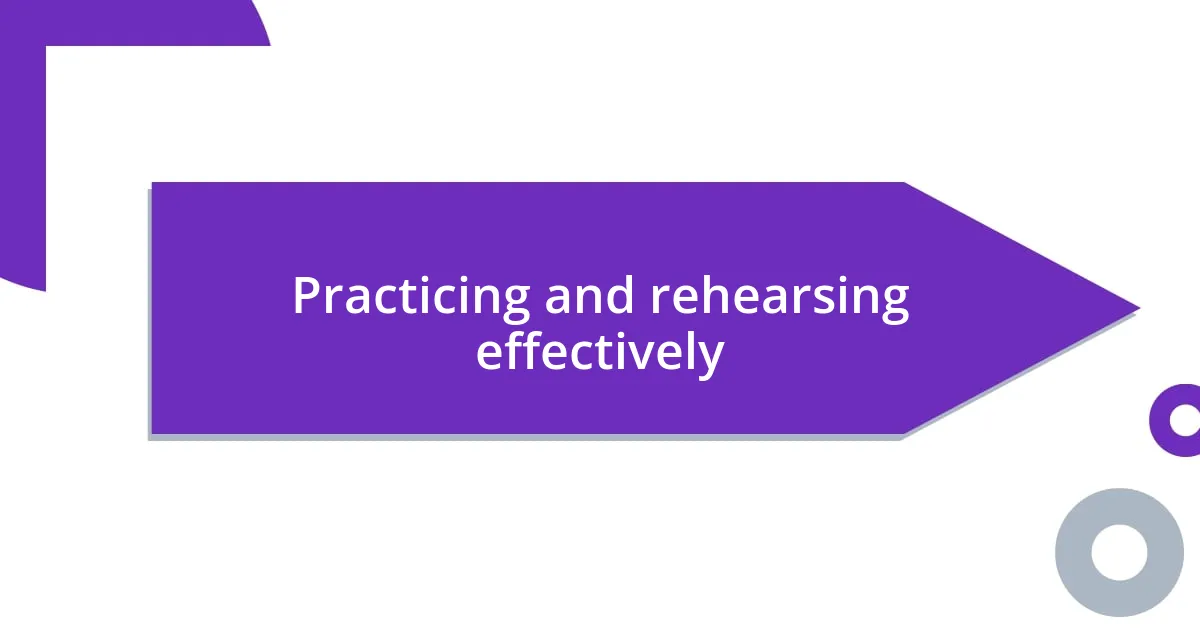
Practicing and rehearsing effectively
When it comes to practicing and rehearsing effectively, I’ve found that preparation starts long before the event day. I remember rehearsing for a speech at a friend’s wedding. Initially, I thought I’d just wing it, but the night before, I decided to run through it in front of a mirror. Seeing my expressions and gestures made me realize how much I could improve. It’s amazing what a little practice can do—did you know that rehearsing out loud can boost your confidence dramatically?
In my experience, practicing in a realistic setting can make all the difference. During the preparation for a community concert, we held a full dress rehearsal on the actual stage. This gave us a feel for the venue, allowing me to adjust how I projected my voice and interacted with the audience. I noticed that the acoustics were different than expected. If we hadn’t done that run-through, would we have been caught off guard? That rehearsal not only sharpened our performance but also bonded the team, revealing our strengths and areas needing improvement.
Another valuable strategy is to invite feedback during your practices. I once invited close friends to listen to a presentation I was preparing for a corporate event. Their insights were invaluable; they pointed out areas where I could be clearer and even suggested some engaging anecdotes. It felt a bit daunting at first—who enjoys having their work critiqued? But in hindsight, that constructive criticism turned my presentation from mediocre to memorable. I learned that embracing feedback is key to honing your skills and making a positive impression when it counts most.
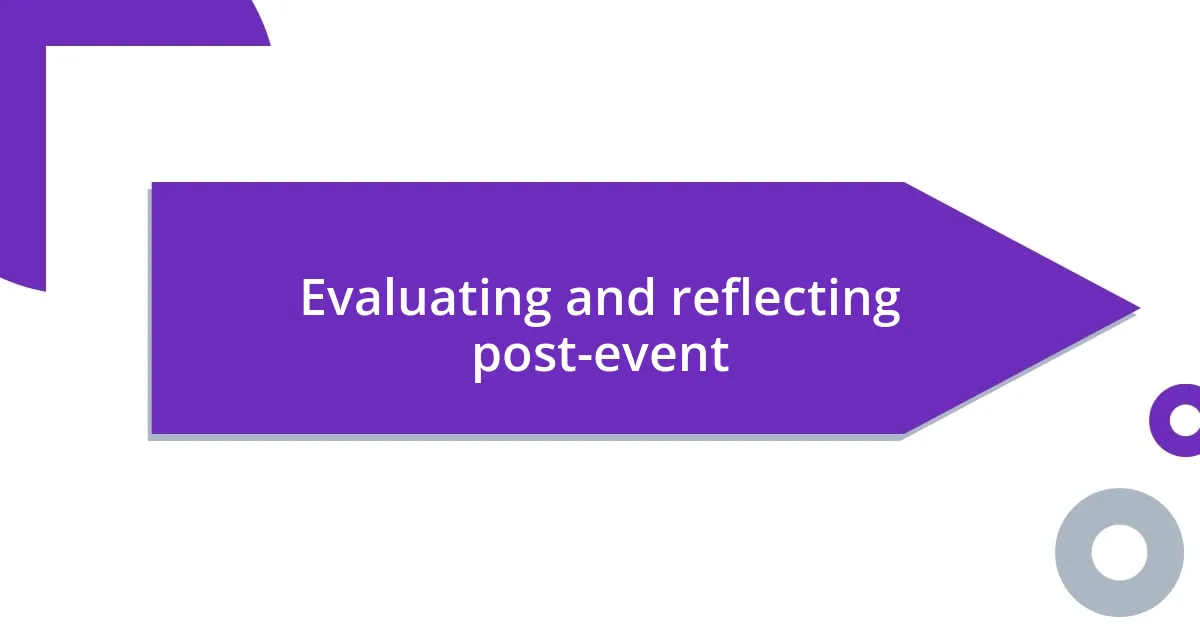
Evaluating and reflecting post-event
Reflecting on the event afterward is just as crucial as the preparation itself. I often find myself journaling about my experiences right after the event ends, which helps me capture the emotions and thoughts while they’re still fresh. For example, after my sister’s wedding, I scribbled down my feelings about the moments that stood out—like the laughter during the speeches and that magical first dance. Have you ever paused to consider how a single moment can make you feel fulfilled? It’s enlightening to sift through those feelings and recognize what truly resonated.
I also like to think about the feedback I receive and its importance in my growth. After organizing a charity fundraiser, I reached out for insights from attendees and volunteers alike. Their perspectives highlighted areas where I excelled and those that required improvement. It struck me how one comment could alter my approach for future events—like when someone mentioned they felt overwhelmed by the schedule. Reflecting on that feedback helped me realize how crucial it is to create clear communication for everyone involved.
Moreover, I like to assess my own performance too. Following a panel discussion I led, I found myself oscillating between pride and self-doubt. Did I engage the audience enough? While some moments felt off, others sparked genuine interest. I learned that self-evaluation mixed with gratitude for the positive experiences can foster resilience. Celebrating the highs while acknowledging the lows creates a balanced narrative that fuels my motivation for the next big event. Have you ever noticed how reflection can transform anxiety into excitement for future challenges? It’s all about growing from the experience.












